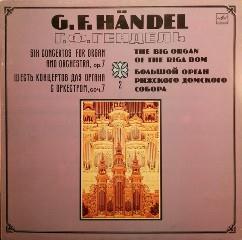Handel - Six Concertos For Organ And Orchestra, Op. 7 (1985)
Handel - Six Concertos For Organ And Orchestra, Op. 7 (1985)

1. Organ Concerto in B-flat major, HWV 306 2. Organ Concerto in A major, HWV 307 3. Organ Concerto in B-flat major, HWV 308 4. Organ Concerto in D minor, HWV 309 5. Organ Concerto in G minor, HWV 310 6. Organ Concerto in B-flat major, HWV 311 Evgenia Lisitsina – organ Latvian Philharmonic Chamber Orchestra Tovy Lifshits – conductor The Big Organ Of The Riga Dom
George Frederick Handel was a colorful character. In 1709 while in Rome, he challenged his contemporary Domenico Scarlatti to a keyboard contest. While it was generally acknowledged that the two shared the prize for playing the harpsichord, Scarlatti conceded defeat to the great German when it came to the organ.
Which is quite unusual because, despite his fame as an organist and improvisor, second only to the great Johann Sebastian, absolutely none of Handel's solo organ music survives, and so we have no idea of what works the two great composers played.
What we are left with is Handel's three sets of six organ concertos that were all composed much later in England. But what a motley lot they are.
It was a common practice in the 1700's to package and publish musical works in groups of six (hence Bach's six each Partitas, English Suites, French Suites and Brandenburg Concertos). Handel's publisher, John Walsh struggled to assemble six concertos into each group. But by various manipulations he did, but what has come down to us today is not pure, unadulterated Handel.
Handel's greatest fame in England rested with his Italian-style Operas. At the premier of each new Opera and Oratorio he got into the habit of improvising at the organ. Occassionally he wrote a new concerto purely as interludes during the larger-scale works.
It was out of these trifles that Walsh gathered together the Organ Concertos.
The first set of six were published by Walsh in 1738 as Opus 4. These are the most genuinely Handel. Three of them were written for performances of his Oratorio Alexander's Feast, one for his Ode for St Cecelia's Day and the last in the set is actually a Harp Concerto.
The second group of three concertos were published in 1740 with no Opus number and now called numbers 13, 14 and 15. Walsh tried to enlist Handel's assistance with this set, but with only moderate success. He made them up from two organ concertos that Handel had re-written into Concerti Grossi, and another Concerti Grosso for harpsichord.
This second set does include the most famous of them all, the Organ Concerto no.13, known as The Cuckoo and the Nightingale. This sparkling concerto, in the Italian style (reminds us of Vivaldi's best) is made up of four movements. A regal Larghetto, a bright, chirpy Allegro in which the organ spectacularly imitates the call of the cuckoo and the lyrical song of the nightingale, in solo and then in duet. Then another stately Larghetto and Allegro.
The final set (not so imaginatively titled A Third Set) was published after Handel's death as Opus 7. Again, some of these concerti were possibly assembled from other works of Handel. Indeed, the three movements of Op.7 no.4 probably do not belong together at all. This final set is less well known than the others.
Despite their haphazard origins, Handel's Organ Concerti are as innovative and musically diverse as anything written in the baroque. While not as rich in counterpoint as Bach's Brandenburgs, they are rich in melody and feeling. From the nobility of Opus 7, no.1 to the irrepresible happiness of the Concerto in F, these are masterworks.
They were certainly popular in their day. The contemporary music historian Charles Burney describes the moving sight of Handel in his old age, now completely blind, being led to the keyboard and proceding to dazzle his audience with his improvisatory skills at the organ.
And improvisatory they were. Handel left much of the organ score blank, or with just key notes provided, labeled Ad libitum. The organist was left to show off his skills of improvisation.
Simon Preston is one of the world's great organists. In this complete set, (his third complete recording) he performs the organ works with respect and the sense of fun that Handel had in mind for these works.
Handel was regarded as the greatest composer of his day in England, yet apart from a few works (Music for the Royal Fireworks, Messiah and Water Music), his music is almost neglected today. ---good-music-guide.com
download (mp3 @320 kbs):
yandex 4shared mega mediafire cloudmailru uplea ge.tt








